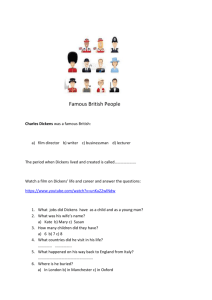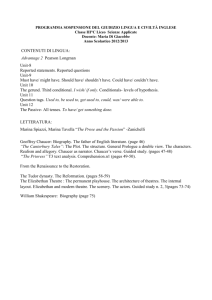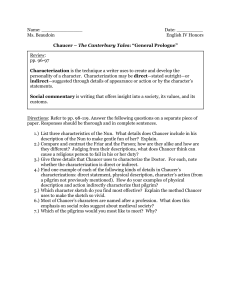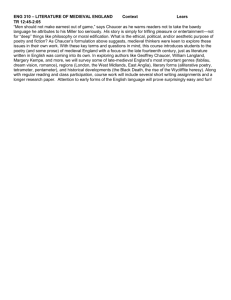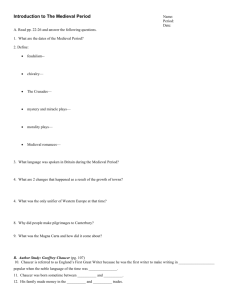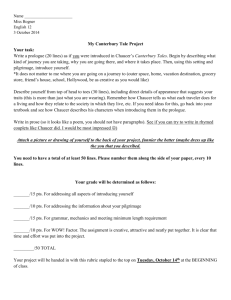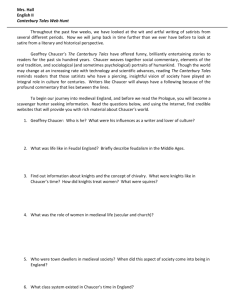10 General Websites on the History of the English Language
advertisement
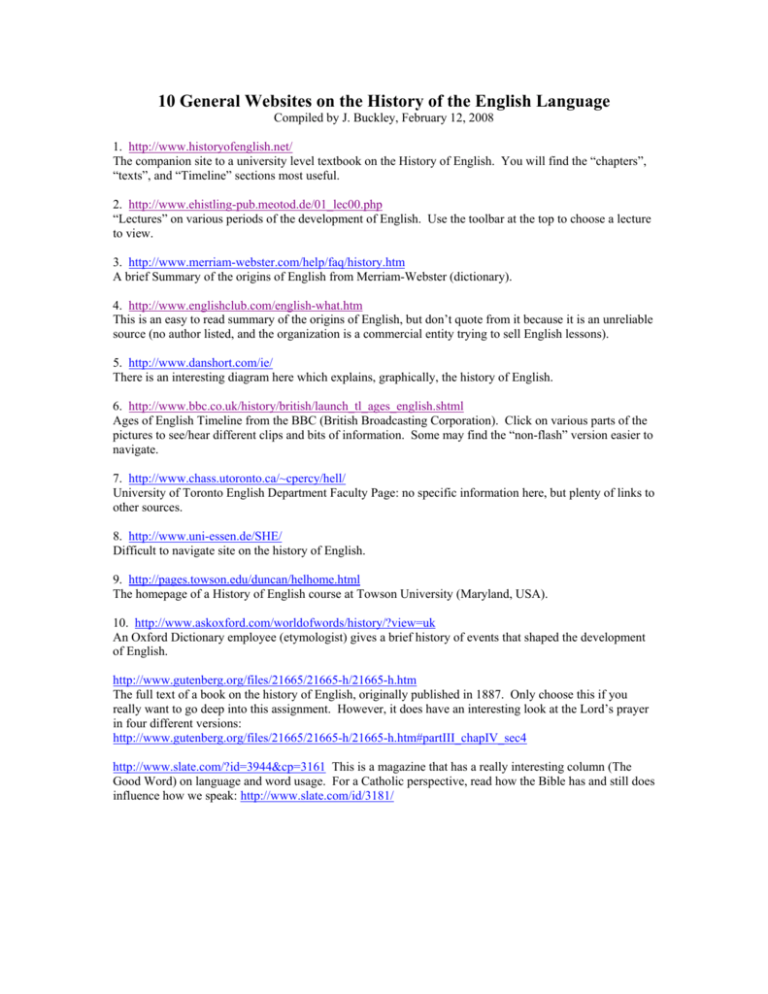
10 General Websites on the History of the English Language Compiled by J. Buckley, February 12, 2008 1. http://www.historyofenglish.net/ The companion site to a university level textbook on the History of English. You will find the “chapters”, “texts”, and “Timeline” sections most useful. 2. http://www.ehistling-pub.meotod.de/01_lec00.php “Lectures” on various periods of the development of English. Use the toolbar at the top to choose a lecture to view. 3. http://www.merriam-webster.com/help/faq/history.htm A brief Summary of the origins of English from Merriam-Webster (dictionary). 4. http://www.englishclub.com/english-what.htm This is an easy to read summary of the origins of English, but don’t quote from it because it is an unreliable source (no author listed, and the organization is a commercial entity trying to sell English lessons). 5. http://www.danshort.com/ie/ There is an interesting diagram here which explains, graphically, the history of English. 6. http://www.bbc.co.uk/history/british/launch_tl_ages_english.shtml Ages of English Timeline from the BBC (British Broadcasting Corporation). Click on various parts of the pictures to see/hear different clips and bits of information. Some may find the “non-flash” version easier to navigate. 7. http://www.chass.utoronto.ca/~cpercy/hell/ University of Toronto English Department Faculty Page: no specific information here, but plenty of links to other sources. 8. http://www.uni-essen.de/SHE/ Difficult to navigate site on the history of English. 9. http://pages.towson.edu/duncan/helhome.html The homepage of a History of English course at Towson University (Maryland, USA). 10. http://www.askoxford.com/worldofwords/history/?view=uk An Oxford Dictionary employee (etymologist) gives a brief history of events that shaped the development of English. http://www.gutenberg.org/files/21665/21665-h/21665-h.htm The full text of a book on the history of English, originally published in 1887. Only choose this if you really want to go deep into this assignment. However, it does have an interesting look at the Lord’s prayer in four different versions: http://www.gutenberg.org/files/21665/21665-h/21665-h.htm#partIII_chapIV_sec4 http://www.slate.com/?id=3944&cp=3161 This is a magazine that has a really interesting column (The Good Word) on language and word usage. For a Catholic perspective, read how the Bible has and still does influence how we speak: http://www.slate.com/id/3181/ Four General Books in the Library that may be of interest: Call #: Author: Title: Summary: REF 422.03 HEN Hendrickson, Robert, The Facts on File encyclopedia of word and phrase origins / Robert Hendrickson. Traces the history of more than seven thousand English words, expressions, and sayings. Call #: Title: 820.8 FOR The Pelican guide to English literature. 1. The age of Chaucer.--2. The age of Shakespeare.--3. From Donne to Marvell.--4. From Contents: Dryden to Johnson.--5. From Blake to Byron.--6. From Dickens to Hardy.--7. The modern age. Call #: 820.9008 POO Author: Pool, Daniel. What Jane Austen ate and Charles Dickens knew : from fox hunting to whist : the facts of daily Title: life in nineteenth-century England / Daniel Pool. Subject: Austen, Jane, 1775-1817 -- Contemporary England. Dickens, Charles, 1812-1870 -- Contemporary England. Note: Includes bibliographical references (p. [395]-403) and index. Call #: Author: Title: Subject: 422.03 CLA Claiborne, Robert. The roots of English : a reader's handbook of word origins / Robert Claiborne. English language -- Roots -- Dictionaries. More Websites and Books Related to Time Periods in this assignment: Shakespearean http://shakespeare.about.com/library/weekly/aa042400a.htm Shakespeare’s Influence on the English language – article from About.com (no author). Call #: 822.33 PAR Author: Partridge, Eric, Shakespeare's bawdy : a literary and psychological essay and a comprehensive glossary / Eric Title: Partridge. Middle English http://www.gutenberg.org/dirs/etext00/cbtls12.txt Canterbury Tales by Chaucer (Middle English) (scroll down a ways past a biographical essay on Chaucer to get to the text). http://www.gutenberg.org/browse/authors/c#a144 Here there are other Chaucer works, including an audio book. Each is available from Project Gutenberg. A film idea might be a movie based on one of Chaucer’s works. You might also find audio clips of people speaking in Middle English or reading aloud one of Chaucer’s works. Victorian English http://www.geocities.com/rk3384/opening.html 820.9008 POO Call #: Author: Pool, Daniel. What Jane Austen ate and Charles Dickens knew: from fox hunting to whist : the facts of daily life Title: in nineteenth-century England / Daniel Pool. A film idea might be a movie based on one of the novels written in the Victorian era – see the first website above for ideas. Canadian English Call #: Author: Title: 427.971 ORK Orkin, Mark M. Canajan, eh? By Mark M. Orkin. Illus. by Isaac Bickerstaff. Call #: REF 427.971 DIC Dictionary of Canadian English; the beginning dictionary [edited by] W. S. Avis [edited and Title: others] based on the work of E. L. Thorndike and Clarence L. Barnhart. http://www.cornerstoneword.com/misc/cdneng/cdneng.htm http://www.cbc.ca/arts/story/2004/06/30/doubledouble040630.html For a comedic look at Sterotypical Canadian Language – see (or listen to) Bob and Doug McKenzie: http://www.geocities.com/Hollywood/Academy/9134/ Also consider looking at the language of Newfoundland or Maritime Provinces, which are very different from Ontario – both in accent and in vocabulary. A film idea for this might be “New Waterford Girl” or a clip from some of the characters on “This Hour Has 22 Minutes”. Colonial English This topic could have several meanings – it could mean the English of America in the time of the settlement of the 13 colonies or it could mean the English of the British colonies – of which there are many (South Africa, Australia, New Zealand, USA, Canada, Hong Kong, even to some degree, Ireland and Scotland). See the description of these books for explanation: http://www.cambridge.org/uk/catalogue/catalogue.asp?isbn=0521830206 http://www.cambridge.org/catalogue/catalogue.asp?isbn=9780521030014 Before you embark on this topic, discuss with your teacher which definition he/she prefers and/or choose a direction for further research (Ie a country). Which ever meaning and/or country you choose, there will be plenty of movie possibilities. Twenties and Thirties AND Sixties and Seventies For these topics, you are looking for two things: The way people spoke during the time period, and the kinds of slang that were prevalent. Naturally, not everyone uses slang terminology Film ideas 20s and 30s: Little Rascals, Early Shirley Temple movies, early Katherine Hepburn movies (like Alice Adams, Stage Door, or Bringing up Baby). Film ideas for the 60s and 70s: Meatballs (Ivan Reichman – Canadian), American Graffiti, The Courtship of Eddie’s Father, later Elvis Presley movies. Techno English Call #: REF 423.1 MIL Author: Miller, Don Ethan, Title: The book of jargon : an essential guide to the inside languages of today / Don Ethan Miller. Also consider information on technobabble, technospeak. Film ideas: Star Trek or some other Science Fiction. And for the truly geeky! Call #: Author: Title: 828.91209 NOE Noel, Ruth S. The languages of Tolkien's Middle-earth / Ruth S. Noel.
